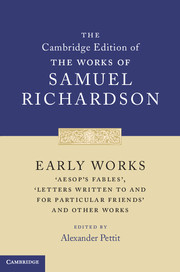Book contents
- Frontmatter
- Dedication
- Contents
- General Editors’ Preface
- Acknowledgements
- Chronology
- List of Abbreviations
- General Introduction
- Textual Introduction
- The Apprentice’s Vade Mecum (1733)
- A Seasonable Examination of the Pleas and Pretensions (1735)
- Preface to Aubin, A Collection of Entertaining Histories and Novels (1739)
- Aesop’s Fables (1739)
- Letters Written to and for Particular Friends (1741)
- Six Original Letters Upon Duelling (1765)
- Appendix: The Infidel Convicted (1731)
- Postscript
- Emendations
- Word-division
- Bibliographical Descriptions of Early Editions
- Explanatory Notes
- Index
Letter XXXVI
Published online by Cambridge University Press: 30 June 2022
- Frontmatter
- Dedication
- Contents
- General Editors’ Preface
- Acknowledgements
- Chronology
- List of Abbreviations
- General Introduction
- Textual Introduction
- The Apprentice’s Vade Mecum (1733)
- A Seasonable Examination of the Pleas and Pretensions (1735)
- Preface to Aubin, A Collection of Entertaining Histories and Novels (1739)
- Aesop’s Fables (1739)
- Letters Written to and for Particular Friends (1741)
- Six Original Letters Upon Duelling (1765)
- Appendix: The Infidel Convicted (1731)
- Postscript
- Emendations
- Word-division
- Bibliographical Descriptions of Early Editions
- Explanatory Notes
- Index
Summary
A Father to a Son, to dissuade him from the Vice of Drinking to Excess.
My dear Son,
It is with a Grief proportioned to my Love, which is extreme, that I understand you have of late neglected your Studies, and given yourself up to the odious Vice of Drinking: What shall I say, what shall I do, to engage you to quit this pernicious Practice, before it becomes such a Habit, that it will be impossible, or at least very difficult, for you to cast it off? Let me require, let me intreat you, to give a suitable Attention to what I have to say on this Head, which I shall offer rather as a warm Friend, than an angry Father; and as I address myself to your Reason, I will leave it to yourself to judge of the Truth of the Observations I have to make to you.
In the first place, with respect to Health, the greatest Jewel of this Life, it is the most destructive of all Vices: Asthma’s, Vertigoes, Palsies, Apoplexies, Gouts, Colicks, Fevers, Dropsies, Consumptions, Stone, and Hypochondriack Diseases, are naturally introduced by excessive Drinking.
All the rest of the Vices together, are not so often punished with sudden Death as this one: What fatal Accidents, what Quarrels, what Breaches between Friend and Friend, are owing to it?
Then, in the second Place; How does it deface Reason, destroy all the tender Impulses of Nature, make a wise Man a Fool, and subject Persons of the brightest Parts to the Contempt of the weakest, and even, in time, extinguish those shining Qualities, which constitute the Difference between a Man of Sense and a Blockhead? For, as a certain very eminent Author well observes, Fools having generally stronger Nerves, and less volatile Spirits, than Men of fine Understandings, that which will rouse the one, will make the other either stupid or frantick; and tho’ it sometimes, while the Fit continues, strengthens the Imagination, yet it always depresses the Judgment; and after the Fit is over, both those Faculties languish together, till, in time, it quenches the Imagination, impairs the Memory, and drowns the Judgment.
- Type
- Chapter
- Information
- Early Works'Aesop's Fables', 'Letters Written to and for Particular Friends' and Other Works, pp. 365 - 367Publisher: Cambridge University PressPrint publication year: 2011



